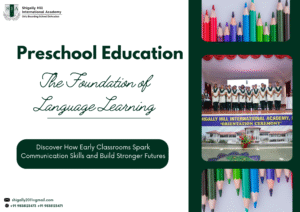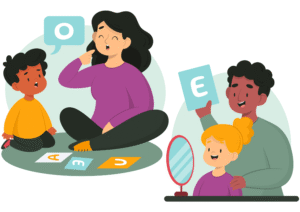
Preschool education is a key stepping stone for all children’s future learning, and its greatest strength is in the acquisition of language. With the changing educational scenario today, schools such as girls boarding schools in India are focusing more on early childhood education to fortify communication skills from the beginning. But why is preschool education so important for language development? What does it provide that makes children speak, listen, and communicate better? Let’s examine the answers in this article written particularly for parents and students interested in the role of early education.
Understanding Preschool Education

Preschool education is a term used to describe formal early education programs for children between 2.5 and 6 years of age. Preschool programs provide a systematic but fun setting in which children are exposed to activities promoting emotional, social, cognitive, and most notably, language growth.
Preschools usually are the initial setting where children experience organized group interactions, thus exposing them to an outside setting that enhances their communication skills beyond what they receive in the home.
The Purpose of Preschool Education
The aim of preschool schooling is not simply to get children ready for school, but to cultivate curiosity, develop early numeracy and literacy, and lay solid language foundations. Kids learn through doing, listening, questioning, and seeing others talk. Those are the moments that are the foundation of language development.
Language Acquisition in Early Childhood
Language is not only a subject; it’s the most important instrument for thinking, communicating, socializing, and learning. Between the ages of three and five, children’s minds are particularly open to language acquisition.
Neuroscientific research shows that by age five, a child’s brain is almost 90% formed. These are the years in which children:
- Learn words rapidly
- Imitate sounds and sentence patterns
- Acquire social rules of conversation like taking turns, tone, and eye contact
These skills are the foundation for effective communication, both academically and socially.
Stages of Language Development
Preschool education fosters every stage of language learning:
- Receptive Language: Comprehending what is being said
- Expressive Language: Using words and sentences to convey messages
- Pragmatic Language: Comprehending social use of language (e.g., greetings, questions, politeness)
By developing these layers, preschools enable children to communicate effectively when they reach primary school.
How Preschool Education Enhances Language Skills

1. A Language-Rich Environment
Preschools are structured to surround children with language and language experiences every day. Whether reading books, singing songs, or engaging in easy conversation with teachers and classmates, preschool learning provides daily opportunities for relevant verbal exchange.
Teachers model proper speech, speak with enthusiasm, and add new vocabulary through theme-oriented learning activities. Posters on classroom walls, labels on materials and equipment, flashcards, and storytelling whiteboards surround children with language stimuli.
2. Learning Through Play and Stories
Play is an effective means in preschool education. Dramatic play areas, puppet performances, role-plays, and storytelling provide children with ways to explore language in imaginative and secure environments.
They:
- Prompt children to talk assertively
- Provide opportunities for them to practice new words
- Teach them sentence grammar, tense, and sequence
- Facilitate them to explore spoken and written words in a natural way
For instance, when a child plays doctor with a patient during dramatic play, they employ medical terms, courteous expressions, and sequential conversation—all enhancing fluency in their language.
3. Interactive Group Activities
Group activities are central to fostering social communication. During preschool studies, children engage in:
- Circle time discussions
- Sing-along sessions
- “Show-and-Tell” presentations
- Question-and-answer games
These experiences prompt the children to listen, reply, and share thoughts. Gradually, they acquire skills to develop opinions, negotiate with friends, and apply verbal skills to resolve issues or seek assistance.
4. Print and Early Writing
Preschoolers also learn the written word of language. Teachers demonstrate how the spoken word is related to print through:
Big books and picture books
- Alphabet charts
- Name tags and classroom labels
- Tracing and pre-writing activities
This visual-verbal link is the foundation for reading and writing, and it consolidates children’s concept of how language operates.
Why Multilingualism Matters
India’s linguistic diversity ensures numerous children hear and speak different languages. Preschool education enables children to understand and adapt to this multilingual backdrop.
Early multilingual exposure:
- Enhances memory, attention, and problem-solving
- Eases the process of learning other languages later in life
- Enhances empathy and flexibility in multicultural communities
Innovative Language Learning Practices at Early Education

Several new preschool education centers in India are embracing innovative methods for language learning in children. These practices exceed old-school storytelling or vocabulary recitation and develop rich, interactive learning experiences.
A few successful practices are:
- Language Corners: Specialized classroom areas where children discover books, flashcards, and story-building materials in various languages.
- Digital Resources and Language Apps: Technology suitable for the child’s age group such as tablets with learning games or bilingual language learning apps enables the child to repeat pronunciation, associate words with pictures, and form sentences.
- Thematic Language Days: Schools observe “English Day,” “Hindi Day,” or “Regional Language Day” where all classroom instruction is in the respective language. Not only does it enhance vocabulary, but it also creates cultural appreciation.
- Peer Tutoring and Language Buddies: Matching children with peer language partners stimulates authentic language exchange and enhances confidence in speaking.
These strategies, when coupled with the supportive environment of early childhood classrooms, render language learning more interactive, engaging, and effective. Through such innovative approaches, preschools are raising the bar in multilingual education.
The Role of Parents and Teachers in Language Development
Teachers have the key role in how preschool children learn language. Their strategy involves:
Speaking in full sentences and not using “baby talk”
- Introducing new vocabulary in context
- Providing time for children to respond carefully
- Encouraging them to tell about feelings, retell events, or identify objects
In high-quality preschools, teachers monitor language development and vary strategies to accommodate each child’s rate and capacity.
Parent Involvement at Home
The home environment has a considerable influence on language development. Parents can enhance preschool education by:
- Reading books together on a daily basis
- Using open-ended questions (e.g., “Why do you think the dog is barking?”)
- Playing word games or rhyming games
- Limiting screen use in favor of conversation and storytelling
- Encouraging children to tell about their drawings or favorite toys
When school and home collaborate, language proficiency is acquired more quickly and organically.
Advantages of Early Language Mastery in Adulthood
Preschool aged children who participate in preschool educational programs arrive at school with:
- Improved listening and understanding abilities
- A sense of confidence in group conversations
- Literacy routines established early
- Ability to understand multi-step directions
These skills provide them with a strong foundation in formal education.
Academic Achievement in the Long Term
Language ability affects performance in every subject—except English. Children who have the ability to read, follow instructions, and write legibly do well in math word problems, science tests, and essay writing.
Good language skill also results in improved performance on entrance tests and interviews as they move through the school system.
Social and Emotional Development
Good communication promotes emotional intelligence. Preschoolers who are able to identify their feelings and communicate needs verbally:
Make friends easily
- Resolve conflicts with words, not hostility
- Feel more at ease in new environments
Preschool education develops these skills naturally by involving children in a group setting and encouraging active speaking roles.
Language Acquisition Challenges and Preschool Assistance
- Delayed speech or poor pronunciation
- Limited vocabulary
- Transitioning from one language to another
- Shyness or social fear of speaking
These challenges can be a result of genetic, environmental, or cultural issues.
Preschool-Based Solutions
High-quality preschools are equipped to address these issues through:
- Speech screenings and language assessments on a regular basis.
- Specialized interventions with qualified professionals
- Confidence-building small group work
- Positive environments that promote all types of communication
Families are frequently engaged in planning interventions so that children receive support at home and at school consistently.
Final Thoughts
Preschool learning is a life-changing experience in building the communications skill of the child. Right from the teaching of simple words to allowing confident communication, it facilitates all stages of developing language. Through stories, songs, play, and interaction with peers, children at preschools learn to communicate, listen, and know the world.
In such high-profile institutions as Indian girls boarding schools, an early focus on language acquisition is enabling the students to achieve academically and socially. For parents, an investment in an excellent preschool program is providing their child with the necessary instruments for a successful future—one word at a time.
Frequently Asked Questions
1. How does preschool education contribute to language development?
Preschool education immerses children in language in all play—from group activity to read- a louds. This immersion develops vocabulary, understanding, and communication through practice and reinforcement every day.
2. Is introducing multiple languages in preschool a good idea?
Yes. Learning more than one language early enhances mental flexibility and cognitive skills. Children are able to differentiate between languages spontaneously and often become proficient in both without getting them mixed up.
3. What is the teacher’s role in preschool language development?
Teachers demonstrate correct speech, pose penetrating questions, and invite children to communicate. Their style of interaction allows children to feel comfortable speaking, making errors, and correcting them.
4. Can preschool education assist children with speech delays?
Yes. Preschool teachers are taught to catch up on delays early. They can work with speech therapists and develop supportive activities whereby the child can catch up in a relaxed, playful atmosphere.
5. How can parents help language development at home?
Parents can support language development by reading to their children, playing word games, taking open-ended questions, and restricting screen time. Developing a language-rich home reinforces what is learned at preschool.
